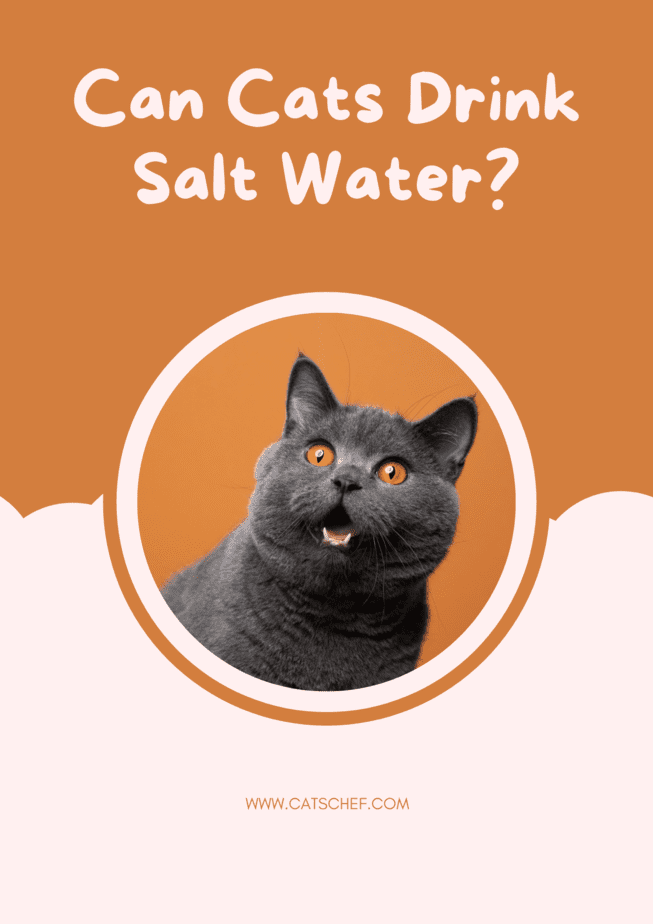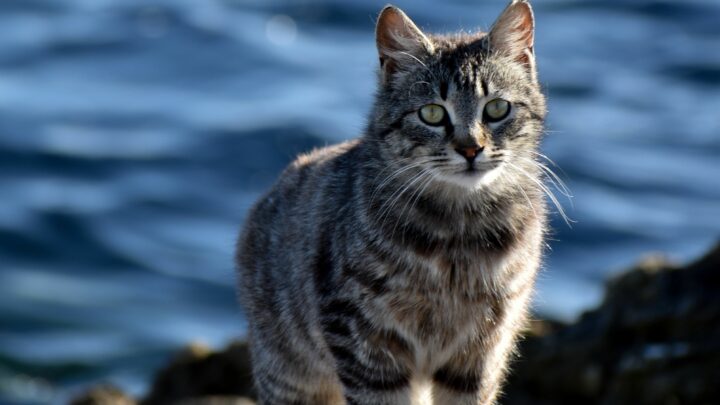“Where are we!?” your furry friend meows, staring at the seawater. “What’s this?” she asks as she tries to give the water a lick without getting her paws wet. She’s completely taken aback by everything surrounding her and thinking of ways to get in trouble. Can cats drink salt water, though?
Your furkid’s a curious creature, but you never thought she would actually want to taste something that’s so… not tasty. You wouldn’t be surprised to find her meowing and begging to have a bite of a mouth-watering rotisserie chicken or a nibble of a paw-licking steak.
Yet here you are, looking at your little monster trying to make her way into the seawater. “Mom, help me out! Let me have ONE lick and I’ll be out of your face!” Remember that humans can’t drink seawater without getting dehydrated. “Mom, c’mon, I want to try it right meow!”
Contemplating letting her have a lick to see what happens. “Mom, please!” Deciding right there and then that you’re not willing to risk your furchild’s health for the sake of staying in her good graces. Grabbing her out of the water before she can meow her way out of trouble.
But, the questions remain: Can cats drink salt water? Can cats get dehydrated from drinking salt water? And what about this one: Can excessive amounts of salt water harm your cat’s health?
Our friends over at the ASPCA (American Society for the Prevention of Cruelty to Animals) say that you shouldn’t be worried about your feline friend taking lapping up a little salt water now and then.
Woohoo! Sounds like a light-at-the-end-of-the-tunnel moment for your furry friend, doesn’t it?
Can cats drink salt water without any consequences?
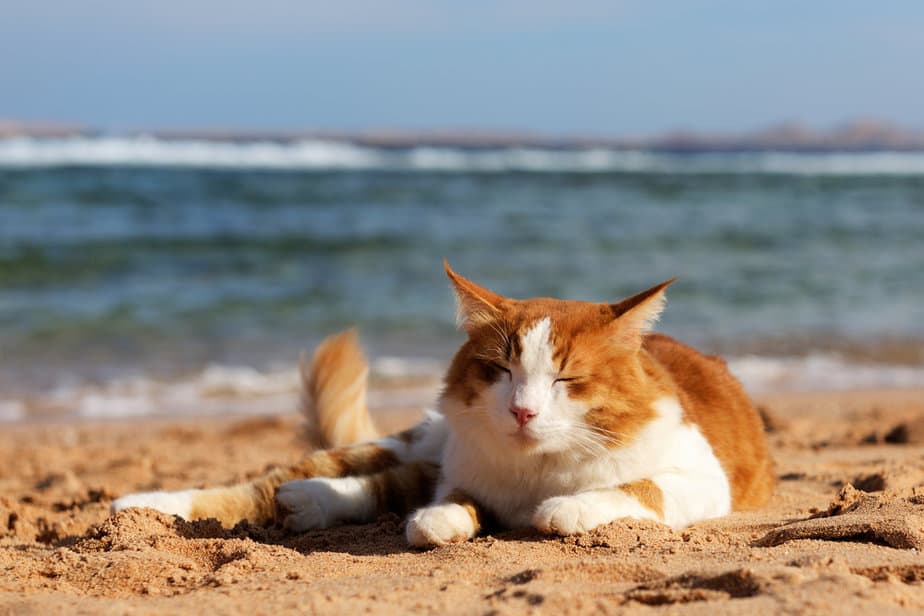
Cats CAN drink salt water! But, there’s always a but when talking about your cat’s eating and drinking habits. Cats are curious creatures and they tend to get into a lot of trouble because they’re constantly munching on something they shouldn’t be.
So, can they consume salt water? Well, cats are carnivores, which means they need meat – more specifically animal protein and nutrients – in their diets to survive and thrive. They don’t need the same foods and drinks you consume whenever you’re looking for a pick-me-up.
They don’t even possess the digestive enzymes necessary to break down and process those foods and drinks, simply because they aren’t a natural part of a cat’s diet.
So, whenever your furry friend eats or drinks something she’s not supposed to, her digestive system has to work overtime (and trust me, Howard from Marketing isn’t the only one who doesn’t like working overtime!)
But, what makes you think that salt water doesn’t belong in your cat’s diet? Cats are very different from humans and they learned to live in very different conditions. They haven’t always been lounging around in apartments, eating everything they can get their paws on (as long as it has a “cat-friendly” label!)
Cats had to adapt to different ways of life. For instance, domesticated cats are believed to have descended from the African Wildcat. African Wildcats lived in the desert where there wasn’t enough fresh water to hydrate themselves, so they had to resort to drinking salt water.
Over time, their kidneys grew stronger and managed to filter out the salt. And here’s the catch – your cat’s kidneys can do the same thing.
What does salt water consist of?
Cats can drink salt water – but, that’s not to say that you should switch from her regular Fiji to whatever you can get from your saltwater pool. “Mom, don’t be ridiculous! You’re better off getting me a floaty – I don’t wanna get my paws wet! Ooh wait, this seems tasty!”
Cats love the taste of salt because it’s one of the rare things they can actually taste. That’s a problem – regardless of what your feline friend might meow to you – because they can’t consume that much salt without some negative repercussions.
Salt water seems to possess quite high levels of salt (duh!?) which may change your mind about letting your furry friend live her best life with her little floaty and sunglasses. 95% water, 2,5% salt, and 2,5% other substances – that’s what your cat can get from drinking salt water.
1. Water

Cats can and should drink water EVERY. SINGLE. DAY!
Water plays a huge part in maintaining your cat’s health. Water helps her digest the foods she’s been munching on and moves nutrients around her body, taking them wherever they need to go.
And we can’t forget that water helps food move through the digestive tract and come out on the other end through urination and bowel movement. Not to mention that water also helps your cat cool down and keep a normal temperature during those hot summers.
Salt water might not be as effective at keeping your four-legged friend happy, healthy, and hydrated. But, when we’re talking about the water part of the saltwater equation, we can’t begin to explain how much better water makes your cat’s quality of life.
Some of the most common symptoms of dehydration are weakness, loss of appetite, loss of coordination, dryness of the mucous membranes, and sunken eyes – you see why water is a pretty big deal, right? Salt water might not be great at keeping your cat completely happy and hydrated, but can do the trick if it was the only source available.
2. Salt
Cats can eat salt, but they shouldn’t eat too much salt on a regular basis.
Need we restate the fact that salt water contains a bunch of salt!? And that drinking salt water every single day means that your cat’s going to consume a lot of salt without even noticing!?
What we’re trying to illustrate here is that salt water might be safe for your feline friend, but that doesn’t mean it’s a great choice. Salt, while necessary for your cat’s health, can lead to some pretty serious repercussions if you’re not careful.
So, what exactly do you have to pay attention to when your cat’s drinking salt water? Consuming high levels of salt, regardless of the source, can cause a condition known as hypernatremia or salt poisoning.
Hypernatremia occurs when your feline consumes more than 42 milligrams of salt a day (which is listed as the maximum daily amount). Some of the most common symptoms to keep an eye out for are excessive thirst and urination, drooling, wheezing, difficulty breathing, vomiting, and diarrhea.
Contact your vet the moment you spot any of these symptoms. Other than that, make sure you’re keeping a close eye on your feline friend should she ever go for a swim.
Should cats drink salt water?
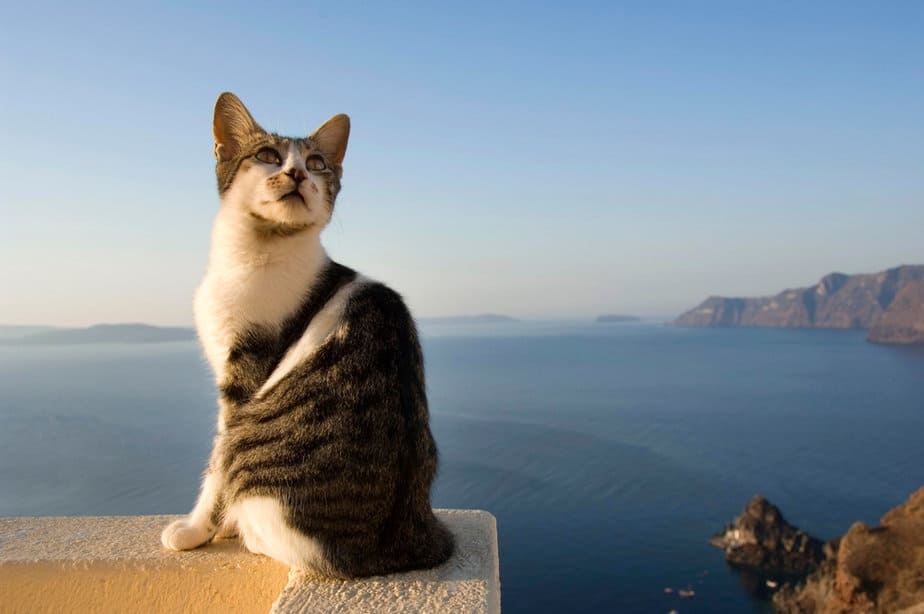
What have we learned up until this point? Cats are super curious and want to eat and drink pretty much everything they can get their paws on. They love drinking salt water because of the taste and they can drink salt water without getting dehydrated.
But, should cats drink salt water? They shouldn’t unless there’s nothing other than salt water available for them to quench their thirst. Cats should get most of their salt from carefully crafted cat foods and cat treats, and not from excessive amounts of salty water.
Sure, your kitto’s kidneys can filter out most of the salt. But, her kidneys shouldn’t go through all the effort every single time. She’s better off drinking fresh, clean water from places other than your backyard pool that hasn’t been cleaned properly since the start of summer.
Lapping up a little bit of seawater or ocean water shouldn’t send your cat to the emergency animal center, if that’s what you’re concerned about. But, there’s no reason for her to drink out of your saltwater pool or fish tank when she can have an abundance of fresh water.
What to do when your cat doesn’t want to stop drinking salt water?
Let’s get one thing straight – cats are weird. They do whatever they want, whenever they want. They don’t care that you spent half an hour trying to explain to them why they shouldn’t eat or drink something that’s going to send them to the vet.
Don’t be alarmed when you notice your cat drinking out of your saltwater pool even after you’ve scolded her and specifically told her that’s out of the question. Saltwater pools don’t have the same amount of salt as seawater or ocean water. She should be fine drinking out of them occasionally.
But, when you notice she’s drinking out of your saltwater pool all the time and refusing to drink fresh water out of her bowl… Schedule an appointment with your vet because that’s not normal cat behavior.
First things first, she could be drawn to salty water because of the taste. She can’t really taste that many things (cats are lacking in the taste bud department, believe it or not), and she could be trying to drink more water while at the same time enjoying a little bit of saltiness.
But on the other hand, she could be drinking salty water because she’s experiencing some sort of deficiency that she’s trying to supplement. She could also be experiencing mental problems (yes, cats can have mental problems) that are driving her towards that fish tank.
So, make sure to consult with your vet the moment you take notice of her salty water obsession. And, make sure you get her away from the source for the time being – you don’t want her sneaking around the pool while you’re waiting for the vet’s assessment and advice.
Can cats drink other types of water?
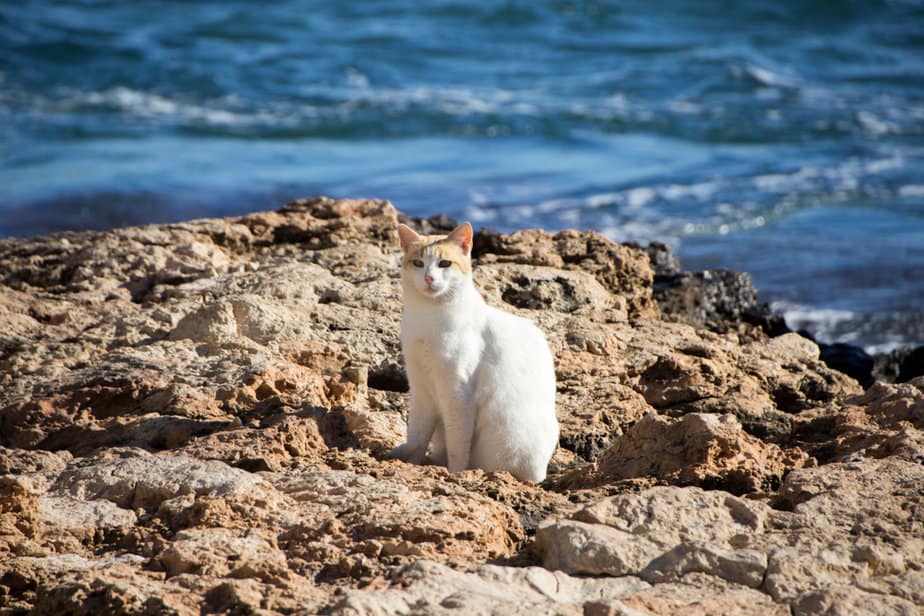
They absolutely can and should. Other types of water could even be a better choice for your furry friend, depending on her nutritional needs. She needs some sort of water for her organs to function properly, and it’s your responsibility to provide her with the type that’s going to be the most effective.
What other types of water are there, you ask? Most humans drink tap water, bottled water, and freshwater, which work great for their feline friends, too.
Most tap water, for instance, contains certain minerals that might be a concern for pet parents, but you can rest assured. Minerals found in unfiltered and untreated tap water shouldn’t cause harm to your cat’s health. And, you can always attach a filter on your tap to make sure she’s getting the best.
Bottled water doesn’t contain anything that could cause harm to your cat, for the most part. Actually, bottled water typically gets chemically treated and filtered to remove anything that could be dangerous for humans.
The only thing you should pay attention to regarding bottled water. Steer clear of those that contain sugar, sweeteners, and additives. These could cause digestive problems such as diarrhea, vomiting, and nausea.
And of course, cats can drink freshwater because this type of water seems to be the most similar to what they would drink in the wild.
Other types of water such as alkaline water, electrolyte water, mineral water, sparkling water, and flavored water shouldn’t be given to your cat without the vet’s stamp of approval. Always make sure to consult with your vet before introducing changes to your cat’s drinking habits.
3 fun facts about cats and water you haven’t heard before
We’ve learned that cats can drink salt water when they’re looking for a pick-me-up. Also, that cats shouldn’t drink salt water every single day. And we’ve learned that salt water doesn’t cause dehydration in cats the same way it does in humans.
But, while we’re on the topic of hydration, there are a couple of things about this weird cats vs. water relationship you probably haven’t heard before. Stick around for 3 fun facts about cats and water!
1. Cats can actually taste the water
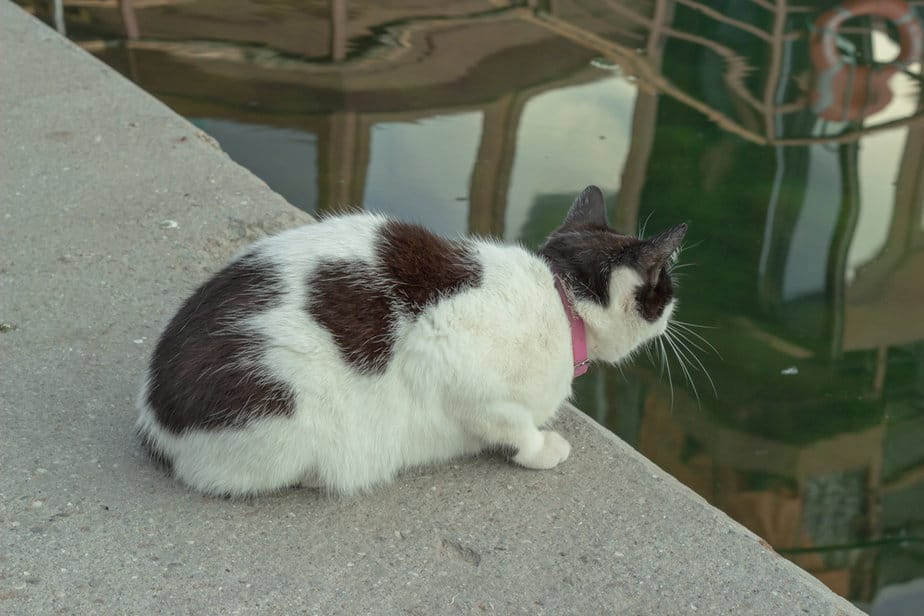
There’s nothing quite like having a tall glass of water after you’ve been sweating on the beach the entire day, right? That feeling you get when the water hits your tongue and hydrates your entire body seems… immeasurable. But, you wouldn’t say you can taste the water, would you?
We always say that water has no taste. Even though some humans (and their precious princesses) would argue that they can taste the difference between different types of water, generally speaking, humans can’t really taste the water.
But, cats and dogs can! Believe it or not, cats and dogs have taste buds that help them taste the water they’re drinking. That means that they don’t drink water because they have to. They drink water because (and when) they think it’s pretty tasty.
2. Cats don’t really get thirsty
Oh, we wonder why cats are so susceptible to dehydration! Cats actually don’t get thirsty the same way humans (or even dogs) do.
You see, they don’t necessarily get the urge to drink water because they’re thirsty. They drink water because they have some food stuck in their teeth and are trying to get rid of it. They drink water because they see you’ve prepared a bowl of something for them to dine on.
“There’s hardly anything exciting about water!” your feline friend might meow. “I honestly don’t understand why I have to drink it!” Therefore, she might become dehydrated super quickly when you’re not around to remind her to have a drink.
3. Cats don’t really like water that doesn’t move
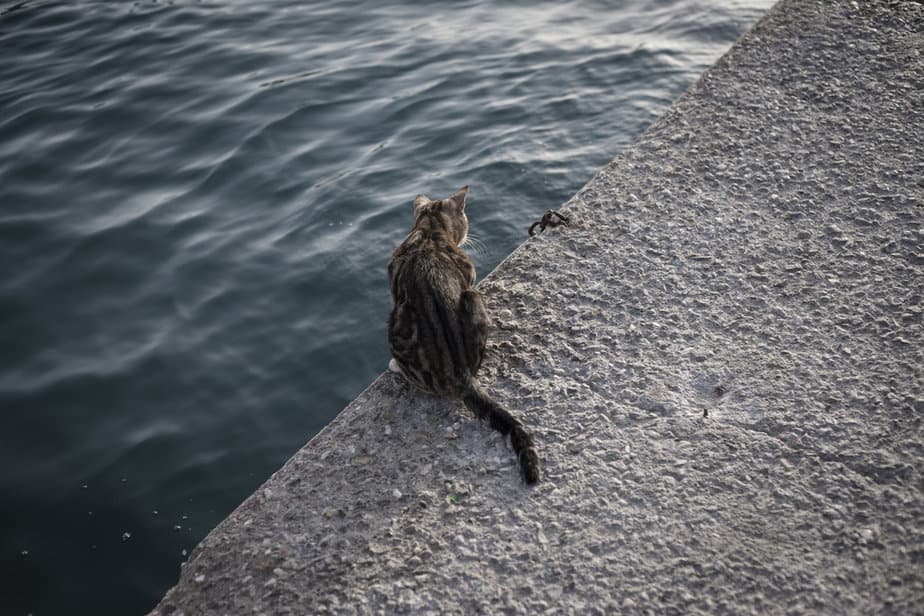
Have you ever noticed your four-legged friend dipping her paw into the water before having a lick? Or pushing the water dish and splashing the water everywhere to get on your nerves? She might not be doing that to push your buttons (but we’re not factoring that out).
She might be doing that because cats aren’t fans of drinking water that doesn’t move. That’s why we say that most cats prefer drinking fresh water to other types of water – drinking out of streams and rivers seems to be their cuppa tea because that’s what they’ve been doing for centuries.
Way back then, cats learned that drinking stagnant water can cause illness. That’s right, ponds and swamps can contain many bacteria and parasites that cause digestive problems. To avoid that, cats learned to look out for themselves and seek out water that moves.
To wrap up… Can cats drink salt water?
Cats can drink salt water! Quit worrying when you notice your cat’s taken a tiny lick out of your saltwater fish tank – she won’t end up at an emergency animal clinic. But, make sure she doesn’t make a habit of it or she might experience a stomachache.
